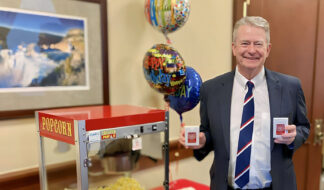Kwanzaa yenu iwe heri! (Happy Kwanzaa!)
Kwanzaa, which is derived from the East African language, Swahili, means: first fruits. It is a cultural, not religious or commercial, African-American holiday. Dr. Maulena Karenga, who was then a professor of Pan African studies in California, created Kwanzaa in 1966. His frequent pilgrimages to Africa, where he witnessed and participated in many African cultural customs and celebrations, left him culturally deprived once he returned to the United States. He believed that African-Americans living here, and in other countries outside the United States, whose origins and traditions stem from Africa, needed a way to rejoice and affirm their roots. Thus, Kwanzaa was created.
Every year, all over the world, African-Americans celebrate Kwanzaa for seven days always beginning on Dec. 26 and ending on Jan. 1.
Each day has a principle and they are known as the Nguzo Saba (Seven Principles):
* Day 1: Imani (Faith)
* Day 2: Kujichagulia (Self determination)
* Day 3: Kuumba (Creativity)
* Day 4: Nia (Purpose)
* Day 5: Ujamaa (Cooperative economics)
* Day 6: Ujima (Collective work & responsibility)
* Day 7: Umoja (Unity)
The celebration should also include a Kwanzaa altar and include the following ritual symbols:
* Mkeka (Woven mat)
* Kikombe Cha Umoja (Unity cup: used during the Tambiko, pouring of libations)
* Kinara (Candle holder)
* Mishumaa Saba (Seven candles: three red, one black and three green)
* Bandera (Flag: Red, black & green)
* Mazao (Crops: Fresh fruits, vegetables, nuts and seeds indigenous to Africa)
* Vibunzi (Ears of corn: Should represent the number of children in the home)
* Zawadi (Gifts: Can be poetry, artwork, etc., and should either be original and hand-crafted or purchased at a black-owned establishment)
Kwanzaa celebrations also include a large Karamu (feast), where traditional African dishes are prepared and shared and at which many African-Americans choose to wear their finest African attire; Bui-bui (robes or gowns) for women and girls and Kanzu (robes or gowns) for men and boys.
Members of the African-American LGBT community here in the metro Detroit area have been celebrating Kwanzaa since 1982.









